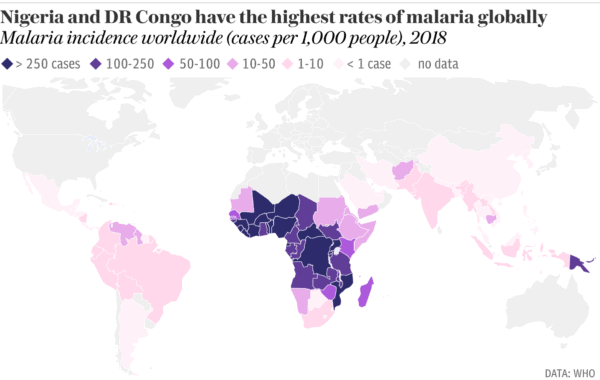Malaria Deaths Could Double This Year Due to Shortages of Life-Saving Drugs and Equipment
Jordan Kelly-Linden, The Telegraph, July 1, 2020
Decades of progress across sub-Saharan Africa could be undone in a matter of months if more is not done to ensure the supply and availability of life-saving malaria treatments, campaigners have warned.
New modelling by the World Health Organization (WHO) found that the number of deaths due to malaria in Sub-Saharan Africa could double to 769,000 this year, as efforts to curb the disease are disrupted by the Covid-19 pandemic.
Global lockdown and restrictions on international travel have resulted in a two-fold crisis in the manufacture and distribution of anti-malaria treatments as well as the availability of vital tools used in community out-reach campaigns.
This disruptions threatens decades of progress against malaria and puts millions of people at risk, the RBM Partnership to End Malaria has warned.
“Every time that there is a delay in availability of vector-control commodities, this results in the suspension of anti-malaria campaigns, but also an increase in malaria cases and the burden on health care facilities,” Dr Andrea Bosman, coordinator of the Global Malaria Programme’s Prevention, Diagnostics & Treatment Unit for WHO, said.
“When the epidemic hit China very strongly in the January – February period that already created a major shortage of some of the key starting materials and active pharmaceutical ingredients,” he said.
Disruption to the supply chain of these vital life-saving drugs have resulted in huge price hikes and shortages across the world.
“The price of chloroquine [an anti-malaria drug] almost doubled and this affected countries even in Latin America where they depend on chloroquine to treat the vivax malaria, which is the dominant parasite in many of their countries,” Dr Bosman said.
In addition to global drug shortages, the pandemic has affected anti-malaria campaigns in a number of unexpected ways.
A surge in demand for N95 respirators masks – used to stop the spread of Covid-19 in hospital environments – has put unexpected pressure on anti-malaria spraying campaigns. Sprayers rely on this piece of kit to prevent them inhaling tiny chemicals particles.
Fear of the virus has also threatened the safety of these workers and medics’ ability to distribute malaria preventatives, Medicines for Malaria Ventures’s vice president George Jagoe said.
“If you’re going into someone’s house to spray their walls, or if you’re distributing medicines door to door for seasonal malaria prevention and there is any concern [that one of these people may be harbouring the virus] people can get spooked.”
This can “disrupt massive numbers of people benefitting from campaigns like that”, he said.

There is a worry that the dual burden of the Covid-19 pandemic and a malaria resurgence cross the African continent could see a repeat of the devastation experienced during the 2014 west African Ebola outbreak – where more people died of other diseases, including malaria, than from Ebola itself, due to lack of access to treatment.
In April WHO regional director for Africa Dr Matshidiso Moeti warned of the suffering these countries may soon face if essential malaria prevention work does not continue.
“A recent analysis has found that if insecticide-treated bed net distribution stops, and case management reduces, malaria deaths in sub-Saharan Africa could double in comparison to 2018,” Dr Moeti said at a briefing.
“This would be the highest number of deaths seen in the region since the year 2000,” she said.















